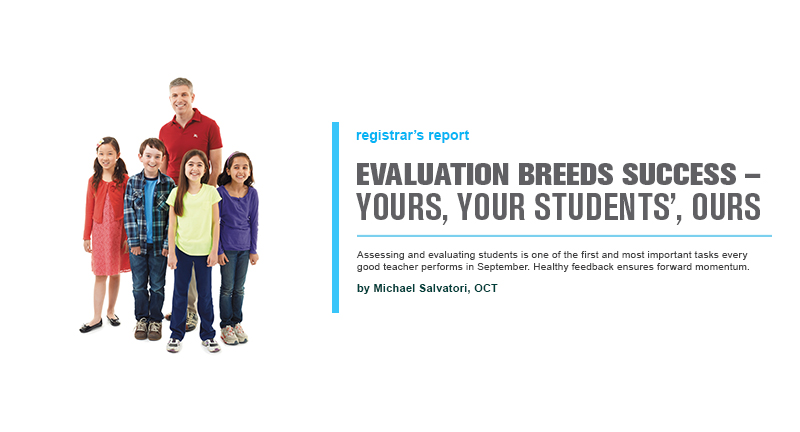
How well you evaluate the knowledge, aptitude and skills of your students — and plan your lessons accordingly — determines to a great extent how much they grow and improve over the year.
The most effective teachers assess, analyze, act and adapt throughout the year. Reinforcing students’ strengths and providing constructive criticism when and where it is needed supports student achievement.
Pausing to reflect and assess is critical for progression in any endeavour. It applies to your students, to you as a lifelong learner and to the College, as the profession’s regulator. That’s why we’re thankful for the report from former Ontario Chief Justice Patrick LeSage, which you can read about in detail.
In the summer of 2011, the College commissioned Mr. LeSage to evaluate its discipline processes and practices. Nine months and 49 recommendations later, he’s given us a blueprint for change that will help to strengthen our ability to serve the public interest.
College Council approved the recommendations in June, ordered further study on a few, and directed those that require legislative change to the provincial government for action. In the meantime, we have taken a number of steps that don’t require legislative change — things like tighter timelines for scheduling hearings and providing support to committees to ensure discipline cases are decided in a timelier manner.
We’ve been working under the same Ontario law for 15 years and are working now with our colleagues at the Ministry of Education to draft new language to make important changes to the Act and regulations that govern the work of the College. In some cases, the law will simply reinforce practices that we’ve long had in place; having our public register — Find a Teacher — online at oct.ca/PublicRegister, for example.
The work, significant in scope and importance, will improve efficiency in our operations and remove the mystery in our processes. For instance, we’ll be able to expedite non-contested discipline matters. In cases in which a member admits to the allegations against him or her, we will be able to move more quickly to a hearing to resolve the matter without spending valuable time and resources that can be directed to other aspects of our work in the public interest.
Our Investigation Committee will be able to apply broader criteria to consider complaints and eliminate those made for an improper purpose, don’t warrant further consideration or in which the public interest isn’t advanced. This will help to solidify existing measures to prevent false accusations against members from proceeding past initial investigations and protect the good names and reputations of members.
You can see on our website that we have linked discipline decisions to our public register. We will also be able to link hearing notices to the register to create greater transparency for employers and the public.
We’re proud of the work we do in the public interest. At the same time, we’re not afraid to thoroughly evaluate what we do so that we can do better. Inviting an external review was an investment in our future and a statement of belief about our processes, practices and our people. However, sometimes the greatest vision comes from the person seeing the situation for the first time.
You know the feeling.
Seeing students arrive that first day, getting to know them, understanding their previous experiences and taking into account their prior learning, helps you to help them. These early assessments help provide a guide to plan the year ahead and to help ensure success.
The former Ontario Chief Justice’s evaluation has done that for your College.
